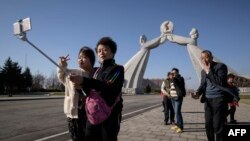North Korea barred new foreign diplomats from entering the country as it intensified efforts to contain the coronavirus.
Pyongyang informed foreign embassies of the measure in a diplomatic letter, according to a Russian Embassy post on Twitter and Facebook accounts.
“Entry to and exit from the country is forbidden for members of the diplomatic corps as well as for new staffers,” said the Facebook notice posted Tuesday.
The Russian Embassy further noted that Pyongyang imposed a 15-day quarantine on foreign diplomatic personnel who need to enter North Korea for unspecified reasons of “necessity.” If they leave quarantine before serving 15 days, they will be requarantined, the embassy said.
Intensified measures
Ken Gause, director of the Adversary Analytics Program at CNA, told VOA on Wednesday that North Korea is taking intensified measures to stop the virus from penetrating into the country because its medical system would not be able to handle the outbreak.
“Their tendency is to clamp down and seal off the country,” Gause continued. He added that the response is typical of North Korea where the leadership “knows that if infection gets inside the country, it’s going to be hard to stop.”
Quarantine measures imposed
North Korea also imposed quarantine measures on diplomats and international organization staff working in the country by restricting them to their embassy buildings and residential complexes, according to the Russian news agency Tass.
Tass also reported that Pyongyang barred foreigners from hotels and restaurants in North Korea.
The new measures come after North Korea temporarily closed its border with China starting Jan. 22 and suspended all air and train links to and from China on Friday.
Working with South Korea
In consultation with South Korea on Jan. 30, Pyongyang closed the inter-Korean liaison office it shares with Seoul in North Korea’s border town of Kaesong.
As of Wednesday, South Korea reported 19 confirmed cases of the virus.
North Korea’s stepped-up measures come as the number of confirmed cases and deaths increase daily in China. There are no cases of the virus reported in North Korea
“Autocratic countries usually have lousy medical infrastructure [and] it’s their natural tendencies to take an action like this,” Gause said.
Call for 'absolute obedience'
North Korea has been ruled by three generations of the Kim dynasty that had strict control over its population since 1945. As the regime copes with the threat posed by the coronavirus, it has called on citizens to show “absolute obedience” to its efforts, the country’s official newspaper the Rodong Sinmun said Saturday.
On Wednesday, North Korea’s state media Korean Central News Agency said passengers crossing into North Korea’s provinces of Jagang and North Hamgyong along its northern border are being examined at checkpoints.
'Emergency anti-epidemic headquarters'
The KCNA report said the government set up “emergency anti-epidemic headquarters” across the country and that “the Party organizations at all levels and officials in the public health sector are launching a campaign to arouse all the masses to the work for preventing the novel coronavirus infection.”
Robert Manning, a senior fellow at the Atlantic Council, said, “I think it is easier for autocratic regimes like North Korea to take swift, stringent measures.”
He added, “But I think their efforts to respond to the pandemic are not that different from those of the U.S.”
Christy Lee contributed to this report which originated in VOA’s Korean Service.




